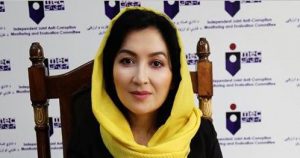Taliban Cannot Withdraw Women’s Identity

Behzad: The progress of the Afghan peace talks has been time consuming, which could be due to disagreements between the two sides. But given that the process of peace is very important, the prolongation of this process is understandable. Dialogue between Afghans could lead to more realistic results than the negotiations between the United States and the Taliban. Overall, the negotiation has made satisfactory progress. The fact that the Afghan government representatives are sitting at the negotiating table with the Taliban is promising. In the meantime, some civil society activists believe that since the fall of the Taliban, nearly two decades women’s capabilities are strengthened
In an interview with the CSHRN, Masoumah Behzad that women have emerged as a potential enemy of the Taliban. This image women have grown stronger in the last two decades. “The Taliban always rejected women and were hostile to them,but in the last two decades, women have made significant progress and have created an identity that cannot be taken away.” Said Masoumah Behzad.
CSHRN: How can presence of women affect the Taliban’s view of women?
Behzad: Although the Taliban claim to be an Islamic government, they do not recognize women’s identity.They cannot withdraw women’s identity by force and through terror. Although few seats are reserved for women in the peace talks, every Afghan woman can represent an identity by playing an important and decisive role in the government.
CSHRN: What issues about women should be further emphasized in the negotiations?
Behzad: The identity of women should not be denied and their role should be preserved in the social, economic and cultural spheres. In general, the basic rights of women should be one of the red lines of the government in the dialogue. Valuessuch as the achievements of the last two decades for the growth of the republic and the values of human rights can also be considered as red lines.
CSHRN: To what extent are women able to represent the government negotiating team?
Behzad: Women in the negotiating team are capable individuals. Since one of the basic components of democracy is voting, the low presence of female members weakens their position. If votes are to be casted, women will not have enough votes to turn the outcome in their favor.
CSHRN: How can peace talks be used as an opportunity for Afghan women?
Behzad: From the point of view of the principles of dialogue, disagreement can be opportunistic. The peace talks between the United States and the Taliban, and the Afghan government and the Taliban made the world to witness the progress of Afghan women. The Taliban raised religious issues in order to put their interpretation of religion on the agenda of the talks. Fortunately, their view of religion is not based on sufficient knowledge and it did not change the negotiations in their favor.
CSHRN: How do you think the presence of the Taliban in power will affect the activities of civil society?
Behzad: Civil society is one of the main components of democracy,but if the Islamic Emirate is to return, democracy will be practically traded with force and violence, in which case negotiations are meaningless.
CSHRN: In your opinion, if a peace agreement is reached, what guarantees the Taliban’s commitment?
Behzad: Since the republic government of Afghanistan has universal supporters, this can be a guarantee. The world is on the side of the republic because of the values that legitimize the republic government and democracy. Therefore, Taliban making commitments in front of the world can be a guarantee, but if the goal is to withdraw the American troops, there will be no guarantees
According to Ms. Behzad, given the Taliban’s violence and atrocities, if an agreement is reached, it is clear that human rights values will be violated. However, she believes thata change in the view of the Taliban is impossible and at the same time, the government’s negotiating team cannot accept Taliban’s interpretations of Islam.